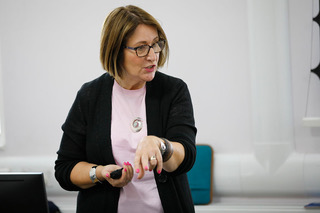 When we think about the future and what graduates might be able to expect, it can be very challenging to pinpoint exactly what skills are going to be crucial post COVID or even bang-in-the-middle of COVID. There’s so much uncertainty. Usually too, when we think of the future we tend to think immediately of technological advance, rapid change and the need to be constantly be up-to-date. Anyone working in tech knows that sharpening your skills and lifelong learning is key. Yet your sharpest weapon in this ever changing landscape will be your interpersonal skills.
When we think about the future and what graduates might be able to expect, it can be very challenging to pinpoint exactly what skills are going to be crucial post COVID or even bang-in-the-middle of COVID. There’s so much uncertainty. Usually too, when we think of the future we tend to think immediately of technological advance, rapid change and the need to be constantly be up-to-date. Anyone working in tech knows that sharpening your skills and lifelong learning is key. Yet your sharpest weapon in this ever changing landscape will be your interpersonal skills.
The future is soft!
The challenges that lie ahead require a strong set of soft skills that are ok with ambiguity and positive uncertainty.
So, specifically – what are the kinds of skills that you need? Rather than using an umbrella term like “communication skills” and “team working” it’s perhaps more helpful to think about how developing different ways of behaving and tapping into competences that you actually already have can make a big impact. Here are some examples:
 1. Empathy and active listening – As the world has become more digital there is a movement away from face-to-face communication. In an era of remote working, communication has been stripped back to online communication tools and platforms, which limits our access to body language, or in the extreme, access to only words. Why do you think emojis were created? Perhaps to allow for digital communication to access emotion – a pictorial depiction of basic emotional feelings at the time. In a world where face to face communication with colleagues is decreasing, active listening, paying attention and directing attention are now more important than ever. That means being much more present during a conversation, slowing down and taking the time to understand what is really going on.
1. Empathy and active listening – As the world has become more digital there is a movement away from face-to-face communication. In an era of remote working, communication has been stripped back to online communication tools and platforms, which limits our access to body language, or in the extreme, access to only words. Why do you think emojis were created? Perhaps to allow for digital communication to access emotion – a pictorial depiction of basic emotional feelings at the time. In a world where face to face communication with colleagues is decreasing, active listening, paying attention and directing attention are now more important than ever. That means being much more present during a conversation, slowing down and taking the time to understand what is really going on.
2. Critical thinking – Accurately assessing a situation by asking questions, challenging assumptions, differentiating between facts and feelings and gain a perspective. It is very very easy to react when the pressure is on rather than taking time to notice subtleties. Critical thinking is something we are really good at if we take the time to ask those questions and recognise when assumptions are being made (most of the time!)

”These skills seem obvious to us but often they can be the hardest to actively DO....
Listen to Emma Sue talking about the key 7 skills you need right now and in the future….
3. Being proactive – This is all about choosing to be resourceful, and take the initiative by looking at what is around you, building up a network and nurturing your relationships. Be aware of how you talk about things and get ready to re-frame your language from ‘there’s nothing I can do’, to a more proactive language such as ‘I have lots of different options… Is there a different approach I can use?’
4. Even more critical thinking! – You may find yourself in the fortunate and luxurious position where you are in a specific role with specific guidelines and processes. However, it is much more likely that you won’t, so you’ll need to broaden and deepen your understanding and experience in multiple disciplines or at the very least know enough to be able to speak with genuine competence and confidence; ultimately become a T-shaped thinker and doer.
 5. Integrity – This continual trend for teams working remotely within different locations requires tech managers and employees to be much more mindful of not only the cultural differences but having to really tune into a more critical thinking and empathetic mind-set. Be emotionally honest and open, don’t withhold information and be receptive to input from others, actively listen, acknowledge and seek to understand their points of view or concerns.
5. Integrity – This continual trend for teams working remotely within different locations requires tech managers and employees to be much more mindful of not only the cultural differences but having to really tune into a more critical thinking and empathetic mind-set. Be emotionally honest and open, don’t withhold information and be receptive to input from others, actively listen, acknowledge and seek to understand their points of view or concerns.
The best way to sharpen these kinds of skills is to actively look for opportunities to practise them. If you can get into the habit of practising being focused, present and actively listening in the very next conversation you have – whether on or off-line – the more this can become embedded into your behavourial muscle memory. The more you can take opportunities to be mindful, to question your assumptions and to ask more questions the easier it will be to do just this when the pressure is on.
The future may well be high tech but it’s also soft. You need both skillsets.
